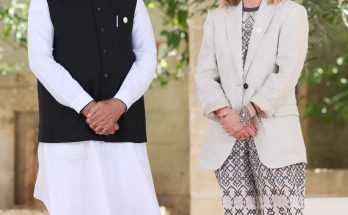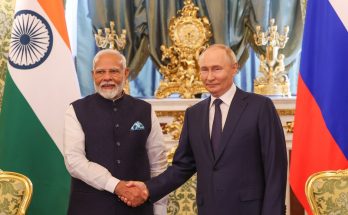
A crisis can trigger ruin and catastrophe, but it also sometimes brings out the best in people and nations. More than any other country in the world, India has shown vividly how to creatively and resolutely harness challenges thrown by the ongoing coronavirus crisis to script its own resurgence as well as contribute to global recovery. Amid apocalyptic death, destruction and dislocation unleashed by a rampaging pandemic, India, the world’s fifth largest economy and an emerging global power, has managed to keep its recovery rate high as well as keep the fatality rate less than 2% – one of the lowest in the world. This has been achieved through multi-pronged efforts and initiatives by the Indian government, including a far-sighted initiative to order a nation-wide lockdown in the early stage of the pandemic when there were barely 600 cases in the country.
World is one Family

For a country of over 1.3 billion people, managing an epidemic that requires social distancing is an incredibly onerous task, but on balance, India has not only taken care of its own people infected by the virus, but has also complemented domestic efforts with timely international assistance to many countries. This trait of empathy and solidarity with friends and partners in the world is deeply embedded in India’s civilisational ethos of ‘Vasudhaiva Kutumbakam” and reflects the country’s rising reputation as a global care-giver and first responder in crises, in the exalted spirit of “the world is one family”. India has been prompt to provide essential drugs and medical items to over 150 countries. This medical assistance was provided quietly, without any fanfare, earning India heartfelt gratitude and admiration of countries, big and small. From US President Donald Trump to Ugandan President Yoweri Museveni, leaders around the world have appreciated India’s timely assistance against a merciless pandemic.
First Responder
The pandemic-related assistance also reaffirmed India’s credentials as the first responder to humanitarian crises and a net security provider in the region. In a journey spanning over 7,500 nautical miles over 55 days, Indian Naval Ship Kesari travelled to the Maldives, Mauritius, Madagascar, Comoros and Seychelles and delivered assistance to India’s maritime neighbours. A part of Mission SAGAR, which crystalizes Prime Minister Modi’s vision of Security and Growth for All in the Region (SAGAR),India’s humanitarian assistance included supplies of essential food items, medicines, Ayurvedic medicines and deployment of Medical Assistance Teams (MAT) to Mauritius and Comoros. India also sent medical teams to Maldives, Mauritius, Comoros and Kuwait to support them deal with the pandemic.
Self-reliant India
The Covid-19 crisis has sown the seeds of an economic renaissance pivoted around “Atmanirbhar Bharat” that promises to revolutionise domestic manufacturing, and make India the hub of global supply chains. The quest for self-reliance has produced tangible results, with India moving from being a net importer of Covid-19-related medical items to a net exporter. Currently, India is manufacturing over 500,000 personal protective equipment (PPE) kits and over 300,000 N-95 masks every day. India is playing the role as the pharmacy of the world during the Covid-19 pandemic with its vast experience and deep knowledge in medicine, setting the tone for many regional and global initiatives, observed the Shanghai Cooperation Organisation Secretary-General Vladimir Norov.
Diplomatic Outreach

Given the transnational spread of the coronavirus pandemic, India launched an unprecedented diplomatic outreach to forge a coherent global response to the crisis. Prime Minister Modi displayed global leadership as he participated in various virtual multilateral summits and spoke to his counterparts from 61 countries. External Affairs Minister S. Jaishankar spoke to foreign ministers from 77 countries. Showcasing India’s Neighbourhood First policy, PM Modi hosted a virtual conference of the leaders of the South Asian Association for Regional Cooperation (SAARC) and pledged $10 million SAARC Emergency Fund to combat the novel coronavirus (COVID-19) in the region. At the first virtual G20 summit, PM Modi underlined the imperative for a new kind of humane globalization, which goes beyond economic and financial calculations. India’s advocacy for people-centric globalisation was reflected the G-20’s decision on debt service suspension for developing countries.
India’s Positive Global Role
The rising global stature of India has been recognised and reaffirmed by the international community in many ways, especially during the last few months of the pandemic.
India has been elected as the chair of the executive board of the World Health Organisation (WHO) at a time when the world is rooting for reforming the global health body. Underlining India’s rising global stock, US President Donald Trump has proposed the expansion of the G7 grouping of the world’s wealthiest countries to include India, Australia, South Korea and Russia. To cap it all, India was overwhelmingly elected as a non-permanent member of the powerful UN Security Council for a two-year term on June 17. In a record of sorts, India won 184 of the 192 ballots cast in the elections for the five non-permanent UNSC seats. It was a vote of confidence in India’s capability to shape the global agenda. India’s two-year term as a non-permanent member of the UNSC will begin from January 1, 2021.
Setting the tone for the eighth stint of India in the UNSC, External Affairs Minister S. Jaishankar underscored that India “can play a positive global role,” in the extraordinary situation spawned by the pandemic and stressed that India seeks to move toward NORMS, a ‘New Orientation for a Reformed Multilateral System. Outlining India’s priorities in the UNSC, he said: “We have always been a voice of reason and a votary of international law. We advocate dialogue, consultation and fairness in our approach to global issues. And we emphasize global development, addressing climate change and eradicating of poverty as central to planet’s future.”
India’s work in the UNSC will be guided by 5Ss, in Prime Minister Modi’s words. This included Sammaan – Respect; Samwad – Dialogue; Sahyog – Cooperation; Shanti – Peace, to create conditions for universal;and Samriddhi (Prosperity). This 5S vision of India’s foreign policy, which can be called “The India Way” is finding an increasing global resonance as a Covid-afflicted world searches for lasting solutions to a range of cross-cutting problems and challenges. India is poised to shape a proactive and constructive agenda for global renewal and remapping the world order, in sync with shifting contemporary realities.

(Manish Chand is CEO & Editor-in-Chief of India Writes Network and India and the World, a pioneering magazine focused on global affairs)
Author Profile

- Manish Chand is Founder-CEO and Editor-in-Chief of India Writes Network (www.indiawrites.org) and India and World, a pioneering magazine focused on international affairs. He is CEO/Director of TGII Media Private Limited, an India-based media, publishing, research and consultancy company.
Latest entries
 India and the WorldJuly 9, 2024Defying West, India sets $100 billion trade target with Russia
India and the WorldJuly 9, 2024Defying West, India sets $100 billion trade target with Russia India and the WorldJuly 5, 2024India at SCO: Takes swipe at Pakistan for cross-border terror, pushes alternative to BRI
India and the WorldJuly 5, 2024India at SCO: Takes swipe at Pakistan for cross-border terror, pushes alternative to BRI India and the WorldJune 14, 2024Modi’s Day 1 in Italy: Bonding with Britain, France
India and the WorldJune 14, 2024Modi’s Day 1 in Italy: Bonding with Britain, France India and the WorldJune 13, 2024G7 summit in Italy: Modi to showcase India as leader of Global South
India and the WorldJune 13, 2024G7 summit in Italy: Modi to showcase India as leader of Global South






